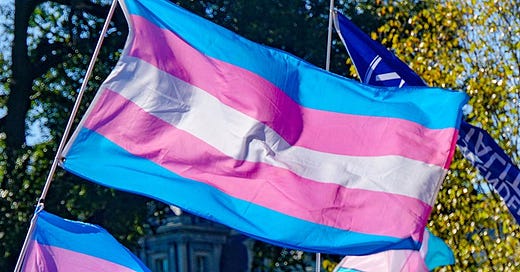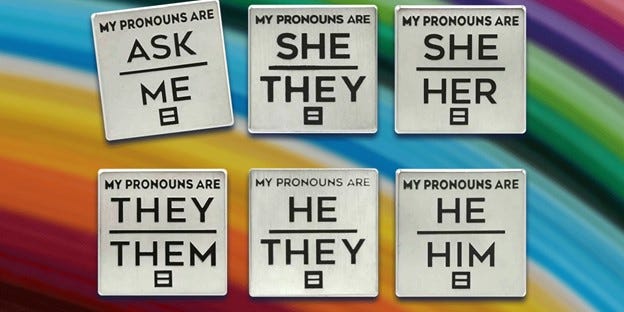Pandemics change a lot of things that you don’t expect. I’m sure the folks who started Zoom are grateful, and I think we’ve all adjusted to meeting virtually now that it’s been proven reliable. I’ve been working from home for three years, like many other people, and I’m grateful for all the amazing things it’s given me.
I’ve watched my kids grow up in slow motion.
Family meals no longer wait for me to get home from my commute.
Working in pajamas feels great.
But as the months and years ticked by with me working in my tender, isolated bubble, I also came to realize that my transness was real, and it was something I needed to act on. So I gathered my courage and went looking for others like me out in the world. Deep down inside, on some primal level, we’re all looking for a place to belong. We need community. And I needed to find my people, the folks who were like me, who I could talk to and receive some kind nods of understanding from.
Writing here is an act of community-building for me. After spending a good amount of time looking around for others to connect with, I’ve discovered that there is a severe lack of representation in the world for transgender people as a whole, but especially for those of us who transition later in life, who maybe have marriages and careers and children.
I looked on social media, and I found a few individuals who have turned into great friends. I read a bunch of fantastic books and several others that were less exciting for me (but any representation is better than none). I watched some documentaries, I looked online for information, and I did some research.
Finding real people? That seemed to be a tough order.
Enter the support group.1
Support groups are great. Their whole point is to create a safe space for folks to gather and talk, to share experiences, to provide resources, and to build community. And good gravy, that’s precisely what I needed. Thing is, nobody was meeting in person yet. The pandemic still loomed over all of us, and gathering for a meeting indoors with more than a couple of people was a scary prospect. I stared at the listings for support groups with trembling fingers. Even thinking of showing up on a webcam felt intimidating2. But at that point, online meetings were the only ones available.
After months of waffling, I finally decided to join one of the regular groups online. The attendance was good, the process was well-established, and everything had a very safe feel. Rules were read and made available for everyone who attended, and we were encouraged to show up in the way that suited our needs best. For some, that meant participating in the verbal conversation with their video camera on, for others it meant listening quietly without contributing their voice. The range of participation was wide, and there was no judgement in how folks opted to show up.
As queer people in a cis-het-normative world, we are often called upon to share our stories and information in ways that are othering. We are treated as tokens. We are expected to be advocates and champions. Honestly, that’s exhausting. Sometimes I don’t want to lead by example. Sometimes I don’t want to demonstrate what queerness looks like. There are days when I barely have the energy to show up for myself, and there’s nothing left for the rest of society.
Having the freedom to participate with quiet and listening is such a gift.
In that first night of meeting with others, I felt welcomed immediately. I was not the only new person. Most people had their pronouns next to their names, and everyone respected what was provided. I was not the only nonbinary person in attendance either, and that felt validating. That’s one part of my identity that is challenging to find in other places. When I shared some thoughts, others listened respectfully. When others shared, I felt a kinship with them.
In retrospect, attending that first group meeting showed me that I wasn’t alone, and I really needed to know that.
Between work and family obligations I found it difficult to attend meetings regularly, but when I did, I often saw familiar names or faces, and I started to see a pattern of showing up for one another. I found myself rooting and clapping for someone’s victories, and I wished I could offer more support to those who expressed sadness and pain. It had taken some work and a willingness to face my anxiety, but I had finally found people like me.
Still, there was more exploration to be had. Other groups also offered online meetings, and I figured it would be good to see the difference in how things were done elsewhere. The one I chose was smaller, more focused on a membership of fewer attendees. But I was brave. I had done this before. I knew how to introduce myself.
“Hi. I’m Robin, and my pronouns are he/him.”
Logging into the new group setting, I adjusted my identifier to show my pronouns, and I waited and watched as others joined. Tile after tile populated with different names, she/her beside each. Five people, she/her. Ten people, she/her. Fifteen, she/her. And there was lonely me, the only he/him in the virtual room. When we started off with introductions, I ended up chuckling and saying, “I guess I’m the last man standing tonight.” I saw a good few other laughing faces in the crowd, and some of them even messaged me to tell me how welcome I was, how they typically have other transmen in the group. I asked if there were other enbys (nonbinary folks), and was told that they were rare. But rest assured, you are in welcoming hands here.
And I was. I felt very welcomed and accepted. Despite being included in a conversation with fifteen women, I was never truly made to feel that I was not wanted or unimportant in any way.
Alas, I wish that I could tell you the funny things we all laughed about, the private emotions we spoke of in confidence, the stories, the tears, and the joys. But I take very seriously the privacy and safety of everyone who comes to a group for support in being a transgender human in a world that isn’t always kind to us.
Many parts of the conversations, however, did make me feel very much like a rooster in the henhouse, which was a truly bizarre circumstance to find myself in (especially as an AFAB3 person). Talk of personal feelings and the myriad emotions tied to being at various stages of transition for all of those women felt like I was somehow violating their confidence by virtue of my presence alone. While I could relate and understand so many of the things they expressed, I felt, for perhaps the first time, like a man listening to women talk.
It was surreal.
For as long as I can remember, I have been forced to identify as female, to find my belonging and self-worth in how I fit into femininity and girl culture. I learned how to fake it pretty damn well. My mother kept my hair long when I was young. I protested the dresses and skirts, but I knew better than to fight the things society demands. I found ways to express myself as someone with more masculine tendencies, but it was always through thinly veiled contempt at not being able to express the rest, that burning need to be myself.
With the sudden freedom to be who I’ve been all along, I began to see all the places that had never fit, all the things that had been a lie to hide behind. It had never been so clear as that night I listened to fifteen women talk about their feelings, their experiences, their genuine selves; I was never a girl, never a woman. I had just been pretending so that I could survive.
Near the end of our time together, the moderator for group that night asked everyone to share something about life that made them feel joyful. I kid you not, fifteen pairs of hands suddenly filled the screens, beautifully painted nails flashing and glittering for all of us to see and smile at. I simply sat in my chair and laughed. And then I thanked them for allowing me to attend, for being kind to the only guy in the room, and they all reminded me how I was welcome to come back again anytime I wanted to.
Where are all the other transmen? I’m still looking.
Sometimes I find them, and we laugh together over stuff we wanted to laugh about when we were twelve. It’s never too late to relive parts of our youth.
Sometimes I’m the only one for miles and miles.
But I know that I don’t have to paint my nails to find people like me who will listen and nod in kind affirmations of understanding.
For those of you who participate in local or remote transgender support groups, thank you for the work you do, even if it’s just you showing up with no video and nothing but quiet.
If you or someone you care about needs help finding a trans support group, please visit TransLifeline.org at the link below4.
https://translifeline.org/resource/support-groups-trans-community/
Lastly, we create community where we are at. I am working to build space for community here. You don’t need to be anything specific to take part, just show up as you see fit in the moment. Thank you for reading and participating in my stories.
Your trans friend,
Robin
Chances are good there’s someone in your life who needs community. Please share this space with them and with other allies. I’m ready to be friends with everyone who needs one.
Please note that no specific information about support groups will be provided in this post in order to protect the safety and privacy of others. All information is either general or has had any identifying information changed for this reason.
Gender dysphoria can manifest in a lot of different ways, including as anxiety in social circumstances. For many trans people this anxiety can keep us from leaving the house altogether. Gender dysphoria is defined as “psychological distress that results from an incongruence between one’s sex assigned at birth and one’s gender identity” (American Psychiatric Association, 2022). https://www.psychiatry.org/patients-families/gender-dysphoria/what-is-gender-dysphoria
Acronyms like AFAB and AMAB mean “assigned female/male at birth.” No one, either cis or trans, gets to choose what sex they are assigned at birth.
This newsletter isn’t affiliated with TransLifeline, but I value their work and their mission to keep trans people safe.







Thanks for the insight into being trans. When you were talking about having to dress like a girl, I could identify in a different way. My mother was conservative and thought that girls should wear dresses. That was a thing when I grew up, but at play time pants were okay. By my teenage years, I had other ideas which included wearing pants all the time and mom was a little disturbed by this. I wore them anyway and never looked back. If you don't mind this being a little long, I will tell you about the Xmas that I got a doll among other things. My big brother as I call him got a fort and guy stuff. I took an instant dislike to that stupid doll and never played with her. Naturally mom didn't dig that. She said she would give the doll away as though that would make me want it. Wrong! I think that may have been the beginning of my liberal tendencies though I was too young to know that at the time.